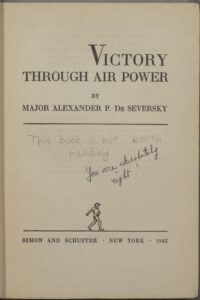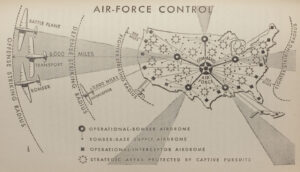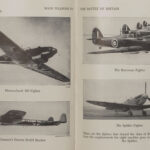This book is blatant propaganda, but the market was no doubt ripe for such literature just after the United States entered World War II. Indeed, Victory Through Air Power was the #1 New York Times bestseller for a month straight and would even go on to become an animated Disney film. Make no mistake, this book was designed to shape public opinion. In an attempt at due diligence, the publishers issue an alert:
Warning to laymen: in reading this remarkable book about the air, keep your feet on the ground! Only with such a cautionary word as this do the Book-of-the-Month Club and its judges feel comfortable in distributing several hundred thousand copies of this book among opinion-making citizens.
This book has a rightful place on the shelves of the MIT Libraries, not only because it was immensely popular, but also because of the Institute’s important contributions to Allied efforts during the Second World War.
Of course that’s not to say every reader at MIT agreed with the author. The title page of our copy contains some incisive commentary. “This book is not worth reading,” one ground-level critic wrote. “You are absolutely right!” a later reader replied.
As stated in earlier entries, we most definitely do not condone writing in library books; it’s a form of vandalism. But it must be said that dialogues carried out in the margins of books – or on their title pages – have a very long history that has always fascinated, and will likely continue to fascinate, scholars and the reading public alike.





